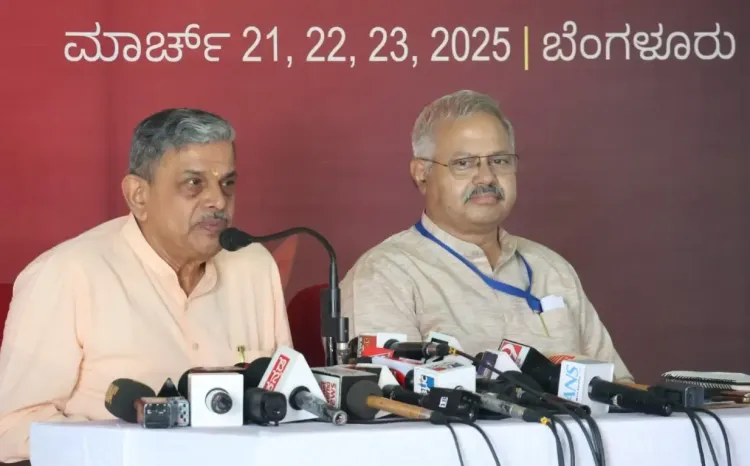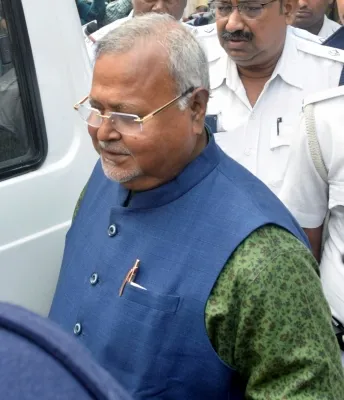RSS: Hindu Identity More Than Just Faith, It's Nationalism

Synopsis
Key Takeaways
- Hindu identity is seen as a nationalist expression.
- Challenges in organizing Hindu society due to diversity.
- There is a revival within the Hindu community focused on progress.
- Internal issues like untouchability and women’s rights need attention.
- Concerns raised regarding the Waqf Bill and land issues.
Bengaluru, March 23 (NationPress) The Rashtriya Swayamsevak Sangh (RSS) has expressed that being identified as a Hindu is a source of pride, serving as a nationalist expression that embodies cultural, spiritual, and civilizational identity beyond mere religion.
During a press conference following the conclusion of the Akhil Bhartiya Pratinidhi Sabha (ABPS) meeting in Bengaluru on Sunday, RSS Sahakaryavah Dattatreya Hosabale addressed this assertion.
“From the Sangh's viewpoint, identifying as a Hindu organization is not shameful. Along with millions of supporters, I firmly believe that being labeled as a Hindu instills pride. It is perfectly acceptable. 'Hindu' signifies a nationalist expression and transcends religious boundaries. It defines the cultural, spiritual, and civilizational identity of this land. Its acceptance is gradually increasing across Bharat, which we view as a positive trend,” Hosabale remarked.
“We face the challenge of unifying Hindu society, a task complicated by its diversity and myriad complexities. Nevertheless, significant progress has been achieved with participation from both the common populace and intellectuals. A growing awareness is emerging that organizing Hindu society is feasible. There is a revival within the Hindu community focused on its welfare and advancement,” he elaborated.
“Currently, Hindu society has gained self-assurance. In the past, under the pretense of secularism—particularly pseudo-secularism—and due to skewed historical narratives, many felt insecure about their identity. Today, however, a confident and dynamic Hindu society is coming to the fore. Nonetheless, the Sangh emphasizes that mere confidence and vitality do not equate to complete success. Internal corrections, such as addressing untouchability and gender issues, still require attention. While Hindu society is awakening, these challenges persist. The Sangh is committed to ensuring these matters are also resolved,” he continued.
Regarding the controversy surrounding the Waqf Bill, he commented, “The government has formed a joint commission to investigate the Waqf issue, and we will await its findings. This concern is not exclusive to the Sangh. In Karnataka, for example, farmers from various political backgrounds have voiced grievances about land seizures. This has become a pressing issue.”
He highlighted that the Waqf Board has claimed Windsor Manor, a luxury hotel in Bengaluru, as its property. “Similar incidents have been reported. The establishment of a joint commission to address these matters is a positive development. We will monitor how this situation unfolds,” he stated.
On the Union government, he remarked, “So far, everything is proceeding well. The RSS refrains from interfering in the government’s daily operations. However, there is a system in place to address public concerns. If required, the RSS will certainly voice its perspective. At present, we believe everything is on track. In terms of national security and international affairs, the situation remains stable. There is no immediate necessity for reassessment,” he concluded.









